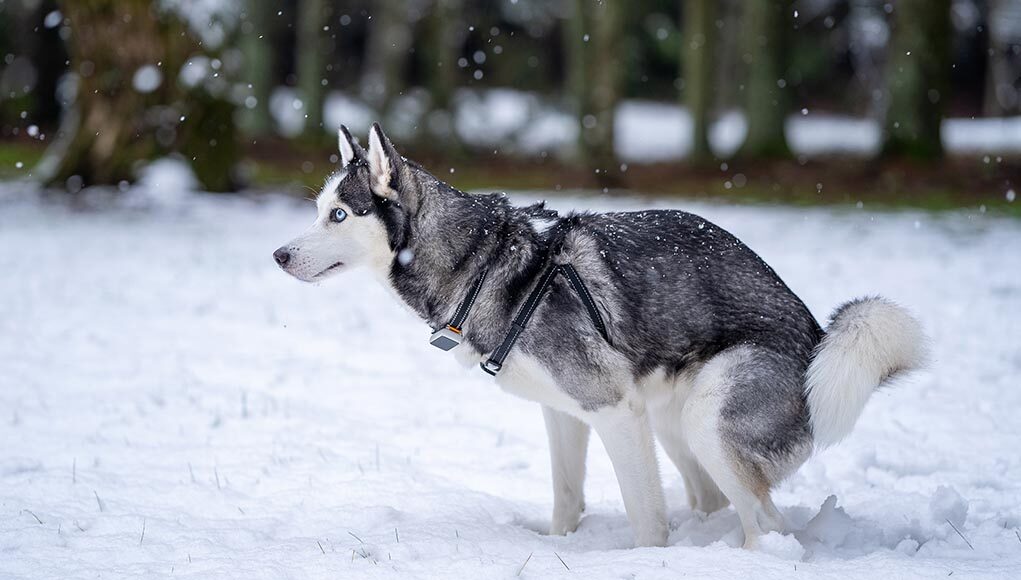Table of Contents
Have you noticed white dog poop lately?
If you've seen white dog poop every time your Fido has a number two, it's best advised to consult with your vet since this can mean different kinds of things.
A dog's stool can be a good indicator of the state of your dog's overall health. Unfortunately, sometimes, it can be caused by an underlying health issue.
Dogs are private poopers. They like to hide before doing their business. It may be weird for them when we stand beside them while they try to poop and scoop it up after they finish.
In this blog, we'll talk about everything you'll need to know about white dog poop. I know it sounds kind of disgusting, but you never know, it can be useful in the future.
Without further ado, let's dive in all the way to dog poop. Okay, maybe not all the way in. That would be gross.
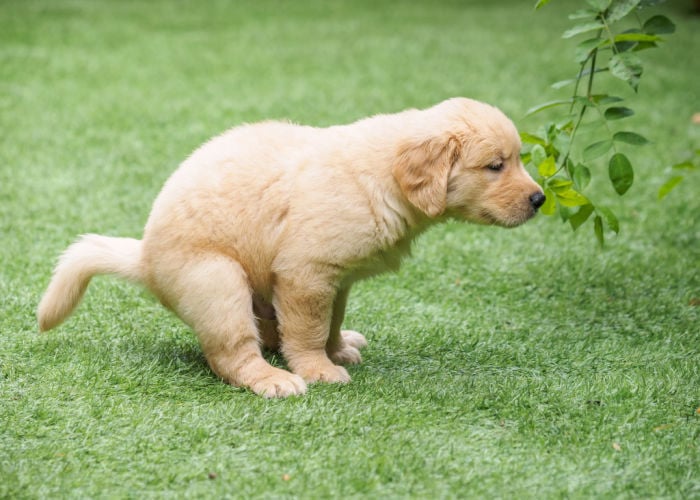
White Dog Poop: What Does It Mean?
Just like humans, a dog's poop can tell you a lot about its overall health.
Before we discuss what causes white dog stool, let us first tackle why your dog's poop color matters.
What Should a Healthy Dog Poop Look Like?
When it comes to determining what a healthy dog stool looks like, we have to consider four main things, and these are:
Color
If you're wondering what color a healthy dog stool should be, it's brown.
The perfect dog poop is chocolate-brown, solid, and a little bit squishy, and its size is proportionate to the amount of food it eats.
No Coating
Dog stool should not have any coating on it. Coating in dog poop can be an indication that there is an inflammation of the large intestine, which typically happens in concurrence with diarrhea.
One way to see if there's a coating is to examine the grass where your pup poop. If the poop leaves behind any traces, this usually means that it has a coating.
Consistency
The consistency of their poop is connected to their diet and overall health. A dog stool should be moist, compact, and easily picked up.
However, determining consistency is not as easy as it sounds. Oftentimes, vets use a numerical system to score the consistency of a dog's poop.
The fecal scoring system gives a value to the stool ranging from 1 to 7. Score 1 represents very hard pellets, and 7 describes a puddle.
Content
Veterinarians also look at the content of your dog's stool. The inside of it should not look any different from the rest.
Unfortunately, certain findings can tell you that your dog is having problems.
For instance, there could be internal parasites such as roundworms and tapeworms. However, it's important to pick up a fresh sample instead of a stool that has been in the grass for many hours.
As you may know, dog stools may have little creatures crawl into them if left outside for a certain amount of time.
Vets tend to run additional tests to check if any parasite species are present. They'll be looking into it through a microscope and checking for any parasitic eggs that may be present.
Foreign materials such as grass, plastic, rocks, and other non-food items can still be present in your dog's fecal.
Another content that might be found will be big clumps of fur, which indicates excessive grooming or licking.
Overgrooming happens due to stress, allergies, skin illnesses, or boredom.
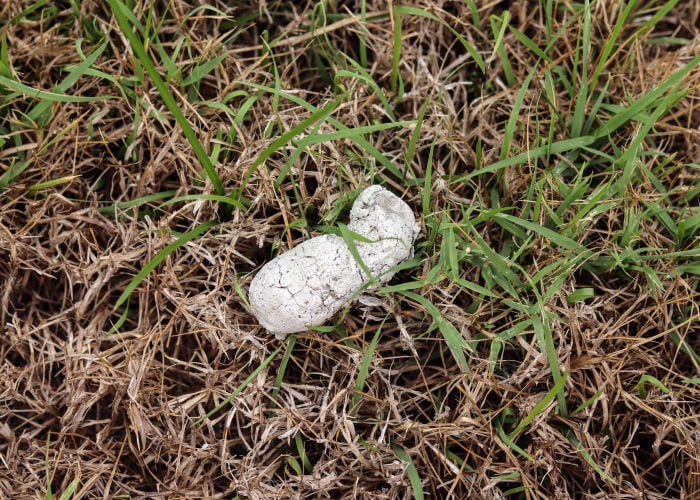
Causes of White Dog Poop
Now let's get down to business. Below, we've compiled a list of a few possible causes of why your dog's stool has turned color white.
High Calcium Intake
One of the most common reasons why dog poop turns white is because of a diet that is high in calcium.
According to research, dogs that eat foods high in minerals tend to release white dog poop, which breaks down faster than brown stools.
If your dog is on a high-calcium diet, their stools will often be white and have a chalky texture.
High calcium can be from large amounts of bones. If your pup is on a raw diet and exhibits white dog poop, it is unlikely to be anything to worry about.
Instead, consult with a pet nutritionist to adjust and have the proper diet for Fido. Moreover, too much calcium can also lead to chronic constipation.
Side Effects of Medications
White stool in dogs can also be caused by certain side effects in some medications.
For instance, medications like liquid barium that were given by your vet can turn your dog's poop temporarily white.
Fortunately, the color will return to normal as soon as the barium passes through your dog's system.
If your dog's poop doesn't return to normal once the liquid barium dosing stops, it is best advised to consult your vet.
Accidentally Eating a White Object
Tracking your dog's diet can be quite helpful from time to time. Think about what they ate recently.
Did they eat something with white color such as socks or fabric from dog toys?
Examine your dog's stool. If you see something white, maybe it's a familiar object. If your dog recently ate a white sock, it'll be able to poop out the sock, and its normal brown poop will be around it.
However, keep in mind that dogs eating other objects like toys, fabrics, and rocks can be dangerous for their digestive system if it gets stuck. Removing stuck objects will only resort to surgery.
Tapeworms
If you've noticed that your pup's poop is covered in what looks like grains of rice, they may be suffering from tapeworms.
Tapeworm eggs are visible to the naked eye. These parasites steal the dog's nutrients and are common in dogs.
Once you suspect your dog is suffering from tapeworms, call your vet immediately to schedule a dewormer appointment. It is also advised to clean your yard, his bed, and any other places where you suspect to be infected.
Internal Issues
Next, we have internal issues. Luckily for you, this problem is the least likely to be the cause of white dog poop.
But this can be serious if your dog's stool is white or gray. White dog poop can mean that there is trouble in their digestion.
During digestion, the liver produces bile which is a green-pigmented material that turns the poop brown.
Lack of bile can be caused by the liver malfunctioning or the gallbladder not releasing it to the intestines to mix with food, resulting in a change of white or gray in the color of the poop.
Another internal problem that causes light gray poop in dogs is when the pancreas is not working properly. The pancreas function as the producer of numerous important digestive enzymes such as insulin.
Internal issues like problems with the liver, pancreas, or gallbladder can be fatal if not treated.
Digestive Problems
Lastly, we have digestive problems. Mucus in dog poop will often look white or yellow. Too much mucus means that your dog is having digestive issues.
Your pup probably ate table scraps or other non-food items such as balls that make them have trouble digesting.
If you see red in the mucus, it means there's blood. And blood will always cause alarm and a trip to the vet.
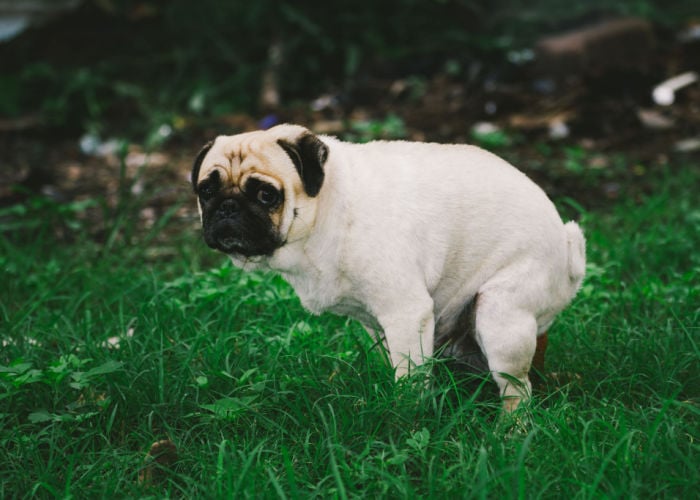
What To Do If Your Dog Poop is White
The treatment for white dog poop will vary on the cause.
For instance, if the cause behind your dog's white stool is a medical reason, then it's best to schedule an appointment with your vet for further examination.
Consulting with your vet is still the best option when we're unsure about an unusual thing that's happening to our dogs.
That's only natural for us dog parents. We'd do anything for our beloved pets.
Fortunately, if the cause is due to external factors, you have nothing to worry about.
If the root of the problem is too much calcium, it is best to try out a new diet for your dog.
If you're unsure about what to feed them, there are now pet nutritionists that can help you decide on what's the best diet for Fido.
Frequently Asked Questions About White Dog Poop
Should I be worried if my dog's poop is white?
This will all depend on the cause of why your dog's poop is white.
If the main cause of the problem is external, then you don't have anything to worry about, as your dog's poop will return to normal in no time.
However, if the cause is medical problems, it should not be taken lightly.
That's why it's best to consult with your vet so that they can further examine your dog's stool—especially if your dog has other symptoms such as vomiting, diarrhea, abdominal pain, and weight loss.
Because these signs can be connected with issues with the liver, pancreas, gallbladder, or intestines which can be fatal.
What does unhealthy dog poop look like?
Now, if you're wondering what other characteristics of unhealthy dog poop are, these are often soft, liquid, and have an abnormal color.
Unhealthy dog stools that have an abnormal color can mean various things. For instance, black or red stools are often connected to internal bleeding, and grey feces often mean pancreatic or maldigestion issues.
However, there are still other factors that you need to consider. If your dog has a hard pebble-like stool, it can often mean your pup suffers from constipation.
Another thing would be if your pup's poop is extra smelly. Fortunately, this is not a serious issue. Instead, it has something to do with your dog's diet.
Why is my dog’s poop yellow?
If you've noticed that your dog's stool is yellow, this can be caused by numerous reasons. For instance, yellow dog poop can be caused by a bacterial or viral infection.
On the other hand, it can also be related to their diet. If a dog is transitioning to a new diet, the usual mechanism of the stomach may not be able to register the nutrients right away. However, it can also mean food intolerance or food allergies.
Parasites such as hookworms, roundworms, tapeworms, whipworms, and protozoa are among the most common causes of yellow stool in dogs.
Lastly, yellow dog poop can be caused by gastrointestinal problems.
If yellow dog poop is accompanied by other symptoms such as weight loss, vomiting, lethargy, and inappetence, it is best to consult your vet as soon as possible.
RELATED: Yellow Dog Poop: What Does It Mean?
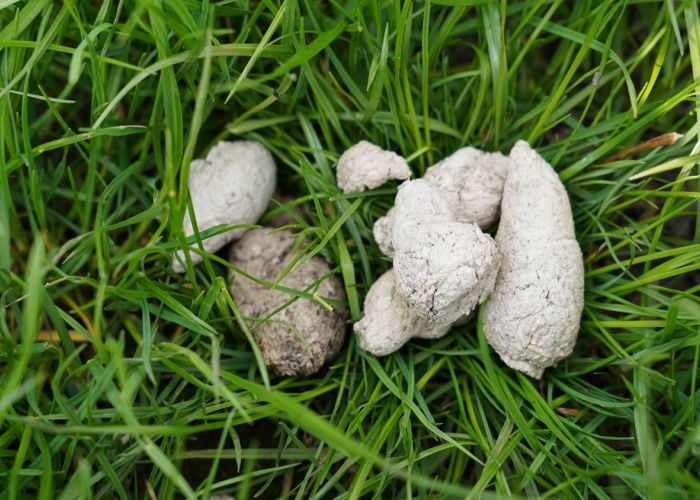
White Dog Poop: Summary
Monitoring your dog's stool is a good way to track its health. Similarly to humans, dog stools can tell you a lot about their overall health.
Although some causes may not be fatal, it is still best to be aware of these conditions. Keeping track of what your dog eats or drinks can go a long way—especially when it comes to veterinarian visits.
If you have the budget, it would be great to schedule your pets for a regular checkup to ensure that they are perfectly healthy and not suffering from any internal diseases.
Moreover, white dog poop can be caused by numerous things. Some are easy to deal with, and some require urgent medical attention.
For instance, if your dog's stool is white, it can mean that they are having too much calcium in their diet. And this can be prevented by adjusting their diet.
If you're unsure about what to feed them, there are now pet nutritionists that can be at your aid.
Other times, it can also be caused by certain side effects from medication such as liquid barium, or they could've accidentally eaten a white object.
Medical issues such as tapeworms, digestive problems, and internal issues are the ones that you should also look out for.
If you suspect that they are having these kinds of problems, it is best to contact your vet as soon as possible.
Problems in the liver, gallbladder, or pancreas should not be taken lightly. These issues should be resolved immediately, or they can be life-threatening.


